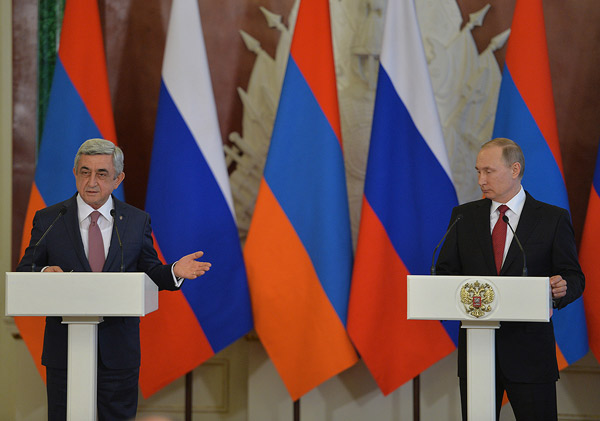No word to be utter in the Kremlin about war instigating and agreements breaking Azerbaijan
On March 14, the President of Armenia, Serzh Sargsyan, was on an official visit to Russia. On March 15, in the Kremlin, at the end of the Armenian-Russian high-level negotiations, the presidents of Russia and Armenia summed up the outcome of the meeting with a joint statement before the mass media.
Serzh Sargsyan said that they have discussed in detail the regional security issue, with the special emphasis on the resolution of the NK conflict, creation of the conditions necessary for moving forward the peace process, “We highly value Russia’s as well as the OSCE Minsk Group other Co-Chairs’ input to an exclusively peaceful resolution of the conflict. At the negotiations, reiterated was the necessity to observe and implement the 1994-95 trilateral ceasefire agreement. We also stressed the necessity to implement agreements reached in Vienna and Saint Petersburg. We concurred that the use of force or threat to use force are totally unacceptable and undermine the peace process.”
By the joint declaration adopted by President of Armenia Serzh Sargsyan and President of the Russian Federation Vladimir Putin as an outcome of the meeting, there is also an emphasis on the need for exclusively peaceful settlement of the conflict based on the principle of territorial integrity, equality and self-determination of the nations. Certainly, it is positive that in Moscow the two presidents also stressed the fulfillment of the agreements reached in Vienna and St. Petersburg in 2016 which are aimed at the prevention of escalation in the conflict zone, the establishment of stability and contribute to the advancement of the peace process. However, importantly, no emphasis is ever made in the Kremlin about the destructive role of Azerbaijan and the damage caused to the negotiation process.
Read also
Moreover, the issue on the deployment of investigation mechanisms on the border is extended for months but the Russian side never indicates the side that is against it. A few days ago, Serzh Sargsyan had stressed in Brussels and Paris the role of the international community to prevent the escalation. The French president, for example, suggested “imposing sanctions in the case of counteracting the peace.”
Today, there is one thing in everyone’s mind that the “war is inevitable”, the situation is increasingly tense about the settlement of the conflict, this situation requires new approaches, but the Kremlin persistently does not want to say a “bitter word” about Aliyev. Everything is limited to “protocolled” wording in the issued statement which by the way cannot but be implemented. For the Armenian side, certainly, it is important to emphasize the need for the fulfillment of the agreements reached in Vienna and St. Petersburg. But Armenia’s strategic ally Russia never crosses “the border”, no word to be utter in the Kremlin about war instigating and agreements breaking Azerbaijan just like after the four-day was in April, Moscow did not condemn the state of the Azerbaijani authorities.
Instead, Putin says the most important thing for Moscow, “Russia continues rendering all possible assistance to the search for a mutually acceptable solution to the conflict both within the framework of the OSCE Minsk Group and in direct contacts with Yerevan and Baku.” But when Serzh Sargsyan reverses that it is necessary to create conditions for continuing the process of negotiations, Putin does not talk about the most important thing, the one who escapes the “conditions”. In this situation, what does Putin expect from the RA authorities on the Karabakh conflict settlement? Maybe he has his reasons for “expectancy”, such as the issue of the deployment of peacekeepers,
Let us not forget that just a few days ago, on March 6, in Moscow, Russian Foreign Minister Sergei Lavrov after the talks with his Azerbaijani counterpart Elmar Mammadyarov, said, “We hope to be able to settle the Nagorno-Karabakh conflict. These include first of all the security and humanitarian issues, the return of the territories surrounding Nagorno-Karabakh that are not under the Azerbaijani control now, the determination of the status of Nagorno-Karabakh with due regard to the opinion of the residents who live there, and the coordination of parameters for the international peacekeeping forces there. We have come to an agreement on the majority of these issues, but we are still discussing two or three issues that are of key importance for the final package.” A number of ministers with an extensive staff attended the talks of the presidents in the Kremlin, including the defense and foreign ministers. Is was announced that some agreements have been reached which “will further enhance the strategic relationship between the two countries.” However, neither Serzh Sargsyan nor Vladimir Putin specifies what agreements it is about. Maybe they refer to more important issues for Russia, such as the establishment of mechanisms between the two countries required for the implementation of payments by the national currency so that Armenia will be able to buy the Russian gas in Russian rubles.
It should also be noted that Serzh Sargsyan spoke about the agreement on a joint group of armed forces, as well as entering into force of the air defense force agreement of the Collective Security in the Caucasus region and the strengthening of security in the South Caucasus. He openly offered to expand the Armenian-Russian military cooperation. Ahead of the talks with Putin, in the article entitled “Security and stable democratic development” published in the Russian “Izvestia” newspaper, Serzh Sargsyan offered the two countries to discuss the establishment of a joint military-industrial complex in Gyumri where the 102nd Russian military base is located.





















































